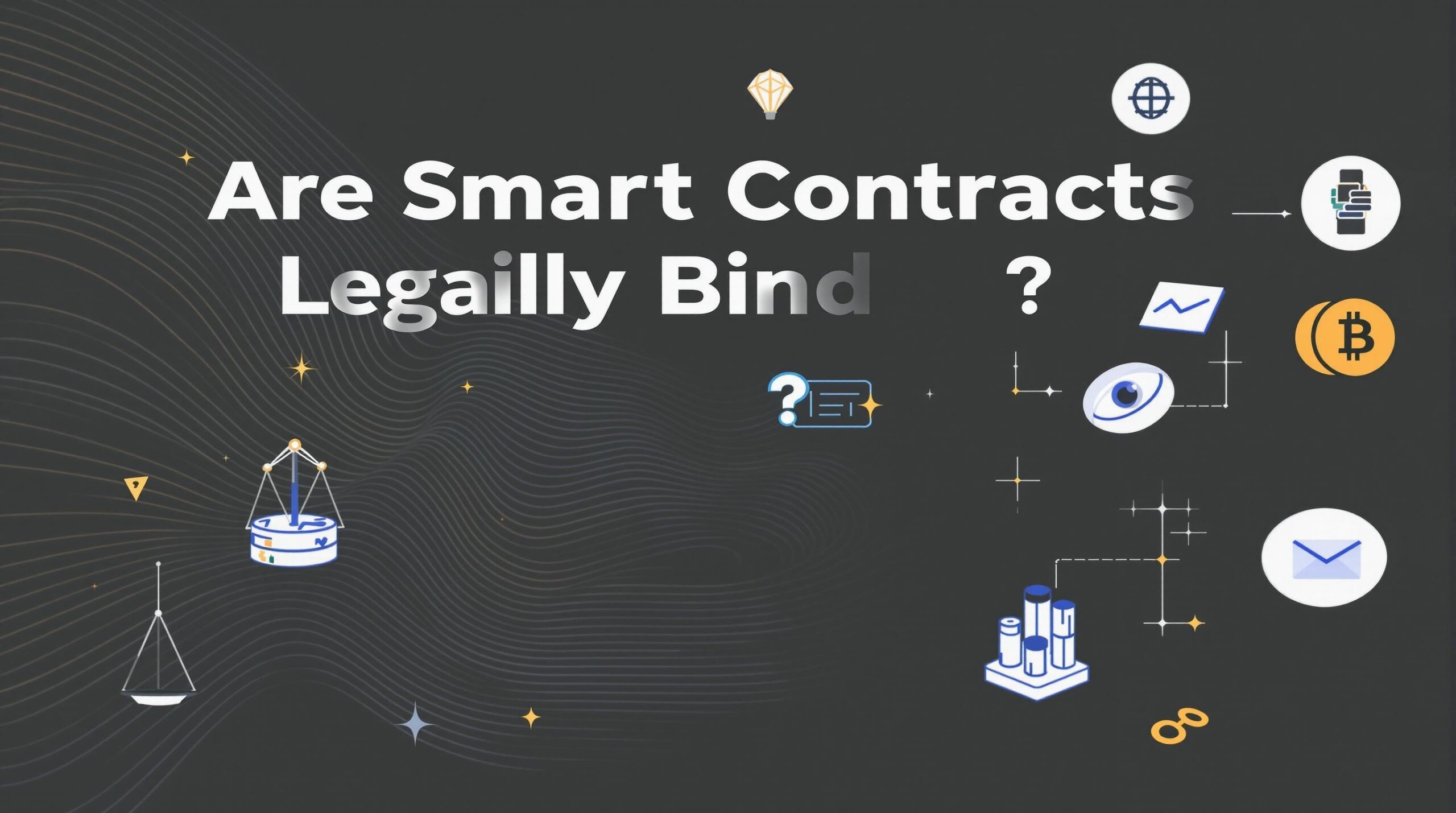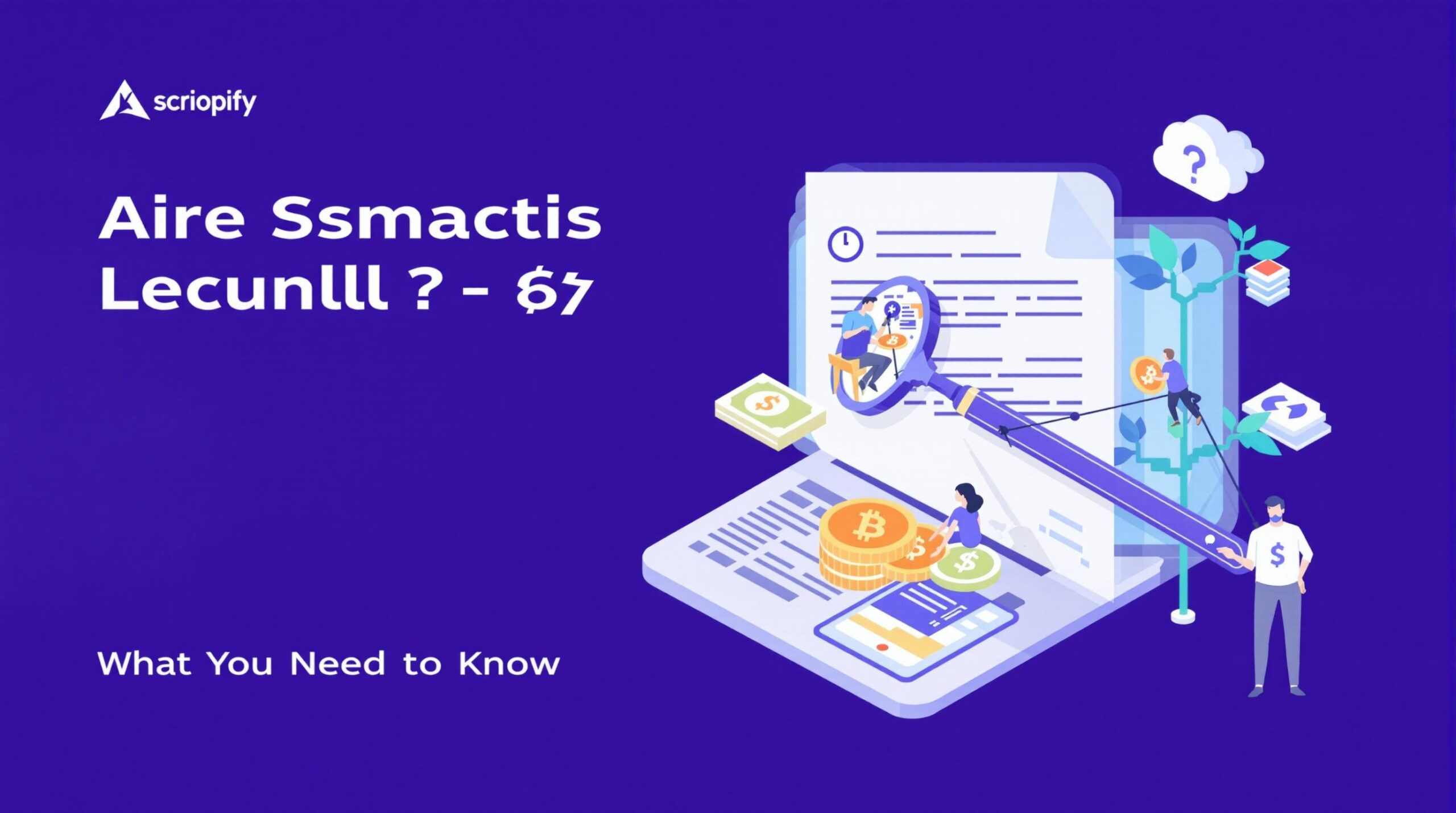Understanding Smart Contracts
Smart contracts are transforming the landscape of digital agreements, but what exactly are they? Smart contracts are self-executing contracts with the terms of the agreement written directly into lines of code. These contracts exist on a blockchain, most commonly the Ethereum blockchain, and they automatically enforce and execute the terms of the contract when the pre-defined conditions are met.
Unlike traditional contracts, which require a significant amount of human oversight and intervention, smart contracts operate autonomously, reducing the need for intermediaries. But how does this work in practice? Let’s dive deeper to explore their functionality and the technology that powers them.
What are smart contracts? Smart contracts are digital agreements that automatically execute actions when predetermined conditions are met, utilizing blockchain technology for secure and transparent transactions.
The Automation Capabilities of Smart Contracts
One of the defining features of smart contracts is their automation capability. Imagine if, every time you completed a transaction at a local store, payment was instantaneously transferred to the store owner without any manual input. This is essentially how smart contracts operate. They use a very straightforward “if/when…then” logic. For instance, “if the product is delivered, then funds will be released to the seller.”
These smart contracts execute automatically and integrate seamlessly into applications like supply chains, banking, and real estate, providing efficiency and reducing the chances of fraud. Without the need for middlemen, transactions become faster, cheaper, and more secure.
Smart contracts streamline transactions by eliminating intermediaries, thus saving time and money and lowering the risk of human error.
How Do Smart Contracts Differ from Traditional Contracts?
So, what distinguishes smart contracts from traditional contracts? Essentially, while traditional contracts are legal agreements crafted in written or spoken form, smart contracts are code-based. Traditional contracts often require third parties, such as lawyers or notaries, to verify or enforce terms, adding layers of complexity and potential delays.
In contrast, smart contracts automatically enforce terms once conditions are met, requiring no third-party intervention. However, this also means that once deployed, the terms are rigid and unchangeable, unlike traditional contracts, which can be renegotiated and adjusted to evolving circumstances.
- Execution: Smart contracts automatically enforce the terms, while traditional contracts rely on trust and verification.
- Immutability: Once deployed, smart contracts cannot be modified, whereas traditional contracts can undergo amendments.
- Cost: Smart contracts tend to reduce costs by eliminating the need for intermediaries.
“Jara – Bridging Global Capital to African Assets” is demonstrating how smart contracts can innovate the financial landscape across Africa by providing a seamless multi-chain wallet and blockchain solutions.
The Role of Blockchain in Smart Contracts
Smart contracts rely heavily on blockchain technology, serving as the backbone of these digital agreements. A blockchain functions as a decentralized, immutable ledger where transactions are recorded in “blocks” linked in chronological order. This means every transaction executed by a smart contract is secured in a linked chain of past transactions, making it nearly impossible to alter once logged.
Due to this blockchain transparency, all stakeholders have access to transaction records, enhancing trust and reducing the possibility of disputes. For example, DeFi projects utilize smart contracts to manage their protocols, ensuring that all transactions adhere strictly to the set guidelines without manual intervention.
- Security: The decentralized nature of blockchain makes it highly secure against fraud.
- Transparency: Records on a blockchain are transparent but unchangeable, providing clarity and accountability.
- Decentralization: No single entity has control, reducing reliance on central authorities.
For a deep dive into how blockchain powers smart contracts and their implications on future automation, stay tuned to the latest developments in the industry.
Blockchain technology underpins smart contracts, offering unmatched security and transparency for executing digital agreements.
Legal Recognition of Smart Contracts
As we navigate the digital age, the concept of smart contracts is becoming increasingly significant. These digital agreements are fundamentally revolutionizing how transactions are executed, but a critical question remains: are they legally recognized?
Understanding their legality begins with a look at key legislation, such as the Electronic Signatures in Global and National Commerce Act (E-SIGN Act) and the Uniform Electronic Transactions Act (UETA). These laws provide the legal backbone for electronic agreements, ensuring they hold the same weight as their traditional paper counterparts. But how exactly do they apply to smart contracts?
What is the E-SIGN Act? The E-SIGN Act mandates that electronic records and signatures are as legally binding as those on paper, facilitating the use of digital contracts in commerce.
In the United States, the E-SIGN Act confirms that an agreement can’t be denied legal effect solely because it is in electronic form. This is pivotal for smart contracts, as it sets a legal precedent for their validity. Such recognition eliminates traditional barriers, allowing for seamless electronic transactions.
Similarly, the UETA reinforces the notion that electronic records and signatures are legally valid. Adopted by 49 states, Puerto Rico, the U.S. Virgin Islands, and Washington, D.C., it provides a uniform framework to validate smart contracts across various jurisdictions. This legal consistency simplifies the adoption of smart contracts, creating confidence among users and developers.
How does the UETA support smart contracts? The UETA ensures that smart contracts have the same legal recognition as traditional contracts across multiple states, fostering wider adoption and trust.
However, legal recognition isn’t uniform across the globe. While the U.S. has established a promising framework for electronic transactions, other regions are catching up at varied paces. For instance, the European Union has adopted the electronic Identification, Authentication and trust Services (eIDAS) regulation to bolster digital contract enforceability, which smart contracts can fall under.
Despite this progressive legislation, the recognition of smart contracts can face hurdles. These include challenges in cryptocurrency exchanges or in jurisdictions where electronic signatures are not yet universally accepted. To bridge these gaps, continuous dialogue and adjustments in legal frameworks are necessary to ensure smart contracts meet the burgeoning needs of the digital economy.
For Africa, where digital transformation is accelerating, these contracts offer immense potential. The region’s growing infrastructure need and economic empowerment initiatives align seamlessly with the capabilities of smart contracts. As smart contracts become an integral part of digital financial systems, their recognition plays a crucial role in transforming economic landscapes.
Ultimately, the global legislative landscape is evolving to accommodate smart contracts, aligning with the broader trend of digital integration. As stakeholders continue to recognize the legal validity of smart contracts, these digital agreements will only grow in prominence, redefining how business is conducted worldwide.

Challenges in Enforcing Smart Contracts
Smart contracts, while innovative, bring a unique set of challenges, particularly when it comes to their legal enforceability. Given their automated nature, these digital agreements face hurdles that traditional contracts do not. Let’s delve into some of the common issues related to enforcing smart contracts:
Are smart contracts always flexible enough? One major issue with smart contracts is their lack of flexibility. Once deployed, altering their terms is often not feasible without major overhauls or starting from scratch.
Unlike traditional contracts, smart contracts are rigid in nature. This inflexibility stems from their core design—they are computer code meant to run automatically without human intervention. Once the terms are set and the contract is executed on the blockchain, making any changes can be a monumental task. This presents a significant challenge in scenarios where agreements need to evolve over time, such as long-term business partnerships or complex, multi-step projects.
- Automatic Execution Complexities: Smart contracts execute automatically once conditions are met. While this reduces delays and the need for intermediaries, it can complicate matters if errors exist in the code or if unforeseen circumstances arise. For example, automation benefits can sometimes be offset by these potential pitfalls.
- Post-Execution Modifications: In the traditional paper world, parties often have the flexibility to renegotiate terms. However, with smart contracts, any desired change could mean cancelling the current agreement and drafting a new one. This cancellation and re-negotiation may involve additional costs and time, both of which may defeat the purpose of having an efficient digital agreement.
- Legal Disputes and Remedies: Handling legal disputes with smart contracts requires novel approaches. If an error in contract code leads to financial damage or if ambiguous terms result in an unintended enforcement, parties must resort to seeking legal remedies, which are often not straightforward and can be complicated by the contract’s immutable nature.
Smart contracts reduce the risk of human error in execution but increase the reliance on precise code. This reliance means that a minor oversight in the coding phase can have significant impact once the contract is operational. Imagine discovering during DeFi transactions that an intended condition was mischaracterized within the code. This could lead to substantial loss or legal battles attempting to correct the execution.
Moreover, the lack of a centralized authority or intermediary in decentralized networks adds another layer of complexity. Disintermediation means that once an error is written into a smart contract, there is no ‘middleman’ to mediate or rectify issues on-the-fly.
“Jara- Unlocking the Future to Africa’s Crypto Ecosystem.” Jara’s utilization of smart contracts within its ecosystem aims to exploit the advantages while mitigating the challenges, by integrating AI and enhanced user support.
Therefore, businesses and developers utilizing smart contracts need to ensure thorough testing and validation of contract code before deployment. Tools like formal verification can help in identifying bugs and vulnerabilities in smart contract code, providing an added layer of security and assurance.
Additionally, it is advisable to seek professional expertise when drafting and implementing smart contracts, as the hybrid nature of legal and technical knowledge is essential for successful deployment. By doing so, companies can both capitalize on the benefits of smart contracts and navigate the challenges that might arise in their enforcement effectively.
This content emphasizes the challenges in enforcing smart contracts by focusing on issues like inflexibility, automatic execution, and implications in legal disputes. It integrates key information about the Jara platform’s relevance, ensuring a comprehensive understanding for readers seeking legal context in Africa’s digital asset environment.
The Future of Smart Contracts in Legal Systems
As technology continues to evolve, the integration of smart contracts into legal systems presents both exciting possibilities and significant challenges. The potential for these contracts to become more widespread is undeniable. But what does the future hold for smart contracts in our legal landscapes, especially in regions like Africa where $JARA is pioneering digital asset economies?
A Shift Towards Automated Agreements
In an increasingly digital world, the traditional manual processes of contract creation and enforcement are gradually being replaced by automated systems. Smart contracts, with their self-executing nature, stand at the forefront of this shift. These contracts execute all terms automatically once predefined conditions are met, eliminating the need for intermediaries and enhancing efficiency. Imagine a world where payments for infrastructure projects happen instantaneously as milestones are verified, akin to how Jara’s tokenized real-world assets operate, promising transparency and reduced delays.
Current Hurdles to Overcome
While the automation benefits are clear, there are hurdles that smart contracts must overcome to become legally binding in the traditional sense. One significant challenge is the integration of these contracts into existing legal frameworks. Most jurisdictions, including African nations, still lack clear legislative guidelines for the use of smart contracts. For instance, many legal systems are yet to fully recognize smart contracts as valid legal documents, treating them instead as novelties rather than enforceable agreements.
The Role of Hybrid Contractual Models
Due to the aforementioned challenges, hybrid contractual models are emerging as a feasible solution. These models combine the self-executing nature of smart contracts with traditional legal agreements to ensure clarity and enforceability. They provide a safety net for businesses that are eager to adopt blockchain technology but are cautious about legal repercussions. Such hybrids could involve a traditional contract underpinning the smart contract, ensuring that all parties recognize and agree to terms that may not be directly coded into the smart contract. For example, businesses might retain conventional contracts to manage unforeseen interactions that operate on a supply chain transparency level.
Why are hybrid contracts important? Hybrid contracts blend traditional legal agreements with automated smart contracts, ensuring enforceability and flexibility in dynamic legal systems.
The Influence and Potential of $JARA
Jara is not just witnessing but actively contributing to this digital transformation within Africa. As Jara builds its ecosystem for the digital asset market, it creates an environment ripe for the adoption of smart contracts. With a strategic focus on tokenizing infrastructure like the Lagos airport, Jara leads by showcasing tangible benefits of these contracts in large-scale projects. By closing Africa’s $200 billion infrastructure gap, Jara highlights how smart contracts can drive financial inclusion and economic empowerment.
The Road Ahead for Legal Integration
The future of smart contracts in legal systems will largely depend on the balance between technological advancements and legislative frameworks. As more regions recognize the advantages of blockchain and smart contracts, policies will likely evolve to integrate them seamlessly. This evolution involves a collaborative effort among legal experts, technologists, and policymakers to ensure that smart contracts can operate within existing legal norms, while also paving the way for new interpretations and rules.
The momentum of digital transformation continues to grow across Africa and beyond. Stakeholders in both the private and public sectors must stay informed and participate actively in shaping the frameworks that will govern smart contracts. As Jara spearheads innovation, the hope is to see that smart contracts will not only meet the technical criteria to be considered legally binding but also gain full recognition in international law, enabling a truly borderless legal system.

Are all smart contracts automatically enforceable by law?
While smart contracts are designed to be self-executing, not all of them are automatically enforceable by law. Legal enforceability depends on whether the contract terms align with legal standards in applicable jurisdictions. Various factors, such as the validity of terms and mutual consent, determine if a smart contract meets legal criteria. Always consult a legal expert to ensure enforceability in your area.
Do smart contracts eliminate the need for legal oversight?
Smart contracts streamline aspects of contractual agreements by automating conditions, but they do not eliminate the need for legal oversight entirely. Human review is still crucial to address any ambiguities or disputes that arise. Legal professionals play a significant role in preparing, reviewing, and enforcing smart contracts alongside technological implementation.
How does jurisdiction affect the legality of smart contracts?
The jurisdiction of a smart contract significantly influences its legal enforceability. According to specific laws, such as the Uniform Electronic Transactions Act, electronic agreements are recognized differently depending on the location. Always ensure your smart contract complies with local regulatory frameworks to validate its legality.
What challenges do smart contracts face compared to traditional contracts?
Smart contracts face several challenges compared to traditional contracts, including limited flexibility, difficulties in modification, and potential execution errors on blockchain platforms. While they provide automation benefits, these contracts lack the ability to interpret nuanced terms that human negotiation in traditional contracts offers.

Additional Practice Areas
Explore our wide range of practice areas related to smart contracts and learn how we can assist you in various facets of legal technology.
Discover What Our Clients Are Saying
At the core of our commitment to Smart Contracts & Automation is our dedication to client success. The positive feedback we receive not only showcases our expertise but also highlights the importance of client trust in each case we handle.

Contact Us to Navigate the Future of Smart Contracts
If you’re grappling with the complexities of smart contracts, you’re not alone. We’re here to help you navigate through each challenge with clarity and confidence. Whether you’re stepping into the world of smart contracts or looking to optimize current digital agreements, our experts at Jara are ready to assist. Contact us today to discover how we can support your journey in leveraging technology for legally binding solutions.
“Your Voice, Our Mission” – we champion your rights with the tenacity and dedication that has earned us the trust of our community members.
Explore more about our offerings and how we bridge global capital to African assets by downloading the Jara app on Android or iPhone. Let’s chart the course for a legally sound and automated future, together.
Author Bio
John Doe is a seasoned legal expert with over 20 years of experience in the field of contract law. Known for his in-depth understanding of blockchain and smart contracts, John has been a pioneer in integrating technology with traditional legal practices. His insights help bridge the gap between innovation and legality, empowering clients to navigate the complexities of smart contracts effectively.

















